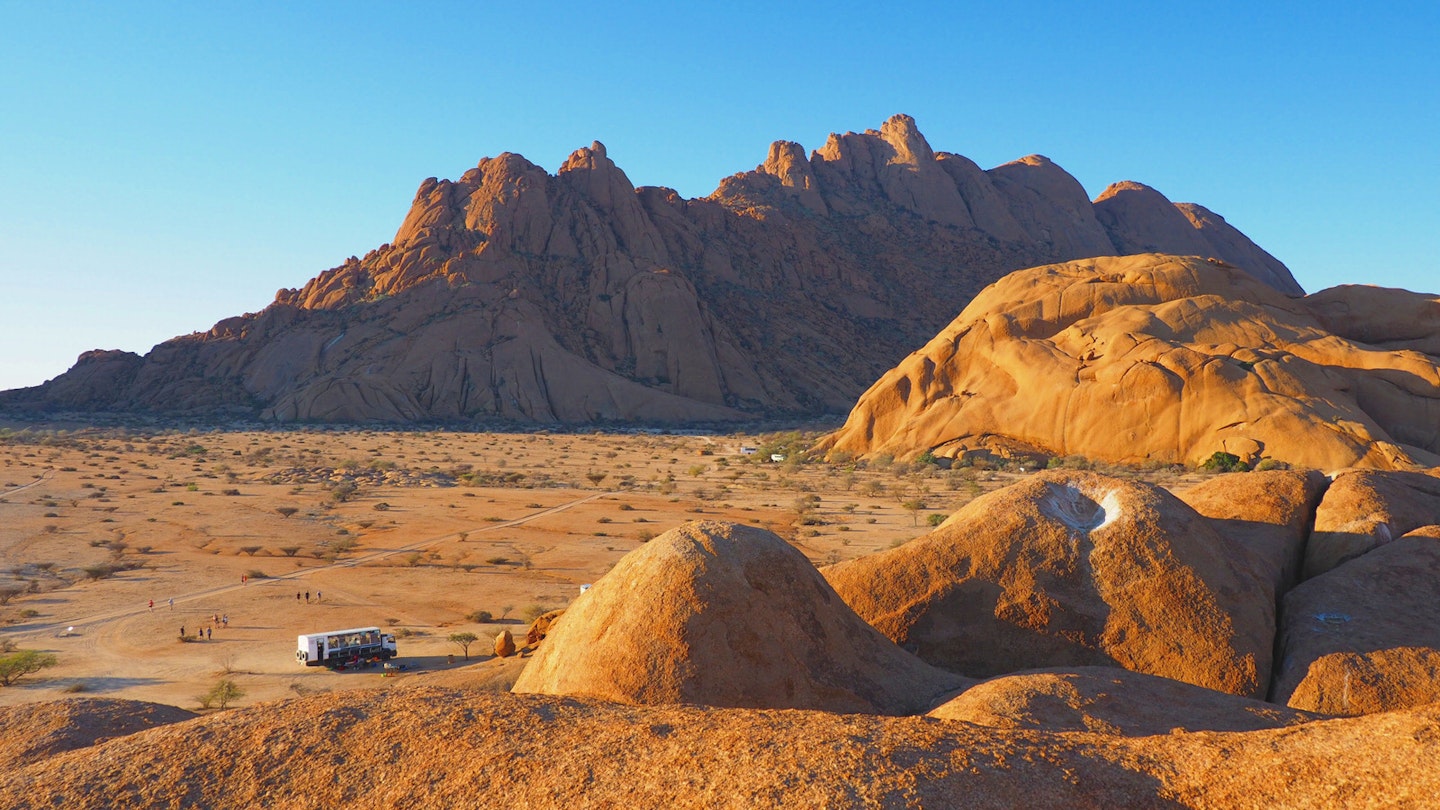Discover Overland Tours in Africa
Bumping across Africa in a converted lorry isn’t exactly luxurious, but overland tours provide an ideal way to visit corners of the continent that are difficult – not to mention expensive – to reach on your own. It’s not just for the gap year crowd either, with most companies catering to all ages, including families. However, is an adventure on an overland tour right for you? Here’s everything you need to know.
Overland Tours Rebooted
Compared to overlanding’s early days, when tours were conducted in ex-army trucks with wooden bench seats, overland tours today are quite comfortable. Purpose-built vehicles, carrying up to two dozen people, have coach-style seats, personal lockers, a fridge, charging points, and a fold-away kitchen. You still camp, assist with the cooking, and learn to make peace with dust (everywhere), but it’s a manageable trip for anyone with a sense of adventure who is capable of pitching a tent. Many campsites also offer the opportunity to upgrade to a room.
Overlanding is still among the cheapest ways to visit Africa, and provides a great introduction to the continent for first-timers, with all logistics taken care of: the tour leader handles things like national park entry permits and border crossings, allowing you to enjoy the exquisite scenery.
A Typical Day on the Road
Although no two days are the same, there’s generally a pattern. Early starts are the norm, either because you have a long distance to cover or you’re heading out on a dawn wildlife drive. Tents are usually required to be down before breakfast (tea and coffee, cereal, fruit, and a hot dish if you’re lucky).
Lunch is typically a packed sandwich on the truck, a fresh pasta salad whipped up at a roadside stop, or, if not included, a stop at a supermarket, with toilet breaks generally of the ‘wild wee’ variety. Upon rolling into camp (occasionally after dark), some of the party will be rostered to prepare dinner. During the evening meal, your tour leader will discuss the plan for the following day before the group heads off to bed, or enjoys a few beers around the campfire or at an onsite bar. Keep in mind that various factors, such as weather and security issues, may force your driver to alter the programme – do not take your itinerary as gospel.
Camplife
Campsites in East Africa and Southern Africa are generally of a high standard, featuring hot showers and usually a bar. Most offer Wi-Fi, but it is rarely free or reliable. Additionally, some boast facilities such as swimming pools, and a few are set in game farms or in or near national parks where elephants and hippos might wander into camp. On certain days, however, you may encounter campsites with no facilities at all. In West Africa trips, these basic bush camps are more common – don’t forget to pack plenty of biodegradable wet wipes. In urban areas, accommodation is usually provided in hostels or budget hotels.
Note that campsites in East and Southern Africa can get busy, so packing earplugs is advisable.
Packing Hacks
Operator packing lists specify the essentials, but to enhance your journey, a pillow, a good book, and a fully-loaded music device are key – free, reliable Wi-Fi at campsites is rare, and buying local SIM cards can be surprisingly expensive. Colds and other viruses tend to spread quickly in overland trucks, so it’s handy to have medication for common travel ailments on-hand, as pharmacies can be few and far between. Healthy snacks can also be difficult to find in some countries, so stock up ahead of time. You may also wish to bring a power bank to charge your devices in your tent.
Overland tour operators supply camp chairs and sleeping mats, but if you’re opting for a long trip or have specific comfort needs, it’s worth bringing your own inflatable mat as an extra layer.
Sustainable Overland Tours
Overlanding produces far fewer emissions compared to flying, but there are several ways you can further reduce your impact on the fragile ecosystems you pass through. Minimize plastic use by filling your own reusable water bottle with treated water provided by operators, and use your own carry bag when shopping for supplies. You can also lessen toilet paper and wet wipe disposal by placing yours in a reusable zip-lock bag, and emptying it into a bin at your campsite later on.
Tipping Explained
Africa has a strong tipping culture, so remember to carry small change (ideally in US$) to tip local guides (up to US$5 per person is sufficient). Tipping your tour leader, driver, and cook at the end of the trip is also customary – most companies suggest each passenger contributes US$2-4 per staff member, per day. However, you should not feel obligated to tip if the service provided is poor.
Choosing an Operator
More than a dozen overland tour operators offer similar routes across the continent, with cheaper itineraries typically indicating fewer included activities and meals (attracting a younger, fun-loving clientele). Guides tend to be from Kenya or South Africa (though sometimes from the UK, Europe, or Australia) and they have varying degrees of local knowledge, so it can be beneficial to bring a guidebook along as well.
Some operators may still require a kitty or local payment, which adds to the total price significantly. Overland tour companies offering a balance of optional and included activities include Intrepid Travel, G Adventures, Dragoman, Absolute Africa, Acacia Africa, and Nomad Africa. This is not an exhaustive list, so do your research and gather feedback on the various companies and routes.





